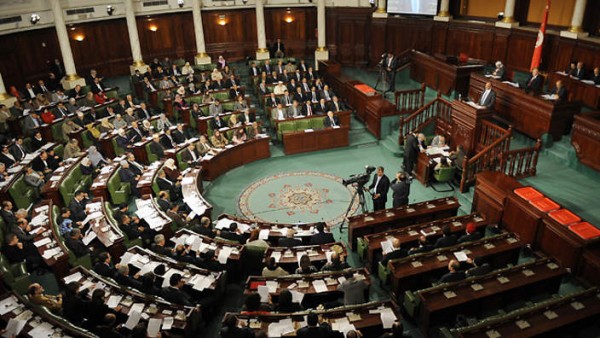
Fethi Belaid/AFP/Getty Images
After months of arduous bargaining and political hurdles, Tunisia is putting the finishing touches on the long-awaited constitution. The Constituent Assembly on January 20 passed another milestone on the road to adopting the document that will pave the way for the nation’s first election of a permanent government after the revolution.
Article 73, which allows bi-national Tunisians to run for presidency but requires a winner to renounce the second citizenship, touched off dramatic reactions in the assembly. Deputies threw papers in the air and hurled accusations at each other, while French-Tunisian parliamentarian Karima Souid chanted “Viva Tunisia.” Opponents of the article fear that the law would open the door for foreign lobbies to impact Tunisian politics. The provision also stipulates that the head of state must be Muslim, a point of criticism from rights groups, and no less than 35 years old.
While the deeply polarized assembly failed to produce the charter by the self-imposed deadline of the revolution anniversary, the nearly finalized document is already hailed as a product of hard-fought compromises. Though rights watchdogs maintain the final draft does not go far enough in respecting international standards (especially on the thorny issue of death penalty), the key accomplishment of the constitution drafters is in aligning the gains of the revolution with the achievements of the past.
The text of the charter preserves without modification the secular nature of the post-colonial document of the Habib Bourguiba era but adds a potent human rights dimension. The new constitution ensures freedom of conscience and judiciary independence, all the while retaining gender equality and endorsing neutrality of mosques. The Islamist Ennahda party had made major concessions on ideology, dropping reference to Sharia as “the source of legislation” in the final draft as well as the controversial “gender complementarity” clause.
Contrary to detractors’ concerns, political realism rather than ideological orientation accounts for the party’s flexibility. After over two years of turbulence, punctuated by assassinations, security chaos and persistent social unrest, the political novices adapted to the rules of the realpolitik game and embraced compromise.
When the assassination of prominent leftist figure Chokri Belaid in February 2013 shook up the country to the core, the first Islamist premier Hamadi Jebali took a principled stance by resigning after failing to reach an agreement within his party. Ten months later, Ali Larayedh saved his party’s face by following suit under the pressure from civil society after the second assassination in a year and the gruesome killing of eight soldiers in Jebel Chaambi.
One cannot underestimate the power of civil society, including the powerful trade union known by its French acronym UGTT, in nudging the Islamist party toward compromise. But it is also Ennahda’s pragmatism and forward-looking vision that inform its refusal to rule by decree or cling to identity politics. The party’s willingness to engage the opposition, heed public opinion and voluntarily transfer power is likely to allow Islamists to maintain influence in the country’s political future.
While Ennahda chief Rached Ghannouchi admits that the transition “lasted too long,” he still prides his party on “transforming the concept of freedom from an important slogan in the revolution to a set of institutions” in two years. Upcoming governments, however, need to make sure that the progressive constitutional text is interpreted right and implemented to avoid the pitfalls of the former regime.
More importantly, the next permanent government will need to address the issue that was at the beating heart of the revolution – the country’s ongoing socio-economic malaise. About 35% of young people remain unemployed, a staggering number in a nation where young people were the drivers of social change. Added to the old challenge are newly present security troubles and regional turmoil emanating from Libya.
With the dust of protracted ideological and political battles settling over Tunisia, it remains to be seen what the country’s new political landscape will look like. It is clear, however, that Islamists will continue to play a role in it and will be faced with real pressing issues.